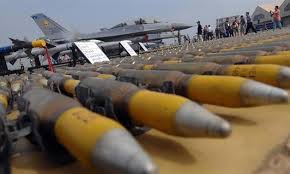Case Studies of Successful Foreign Military Sales (FMS) Programs

Foreign Military Sales (FMS) programs have been a cornerstone of international defense cooperation, enhancing the security capabilities of allied nations and strengthening geopolitical alliances. These programs, facilitated by the U.S. government, provide foreign allies with defense articles, services, and training. Here, we explore some notable case studies of successful FMS programs, illustrating their significant impact on global security and international relations.
1. F-16 Fighter Jets to Morocco
In 2019, Morocco made a major leap in modernizing its air force through an FMS deal with the United States for 25 new F-16 Block 72 fighter jets and the upgrade of 23 existing F-16s to the F-16V configuration. This $3.8 billion deal significantly bolstered Morocco’s air defense capabilities, providing advanced avionics, radar, and weaponry.
Impact and Success Factors:
- Enhanced Regional Security: The deal reinforced Morocco’s role as a key security partner in North Africa, contributing to stability in a region often fraught with security challenges.
- Strategic Partnership: This transaction strengthened U.S.-Morocco relations, showcasing the U.S.’s commitment to its allies in the fight against terrorism and regional threats.
- Technology Transfer and Training: Alongside the aircraft, extensive training and maintenance support ensured Moroccan pilots and technicians could effectively operate and sustain the new systems.
2. Patriot Missile Systems to Poland
Poland’s acquisition of the Patriot missile defense system marked a significant enhancement of its national defense capabilities. In 2018, Poland signed a $4.75 billion FMS agreement for Phase I of the program, with Phase II to follow, including further missile systems and upgrades.
Impact and Success Factors:
- Strengthening NATO’s Eastern Flank: This deal was pivotal in bolstering NATO’s defensive posture in Eastern Europe amid rising tensions with Russia.
- Interoperability with NATO: The Patriot systems ensure that Poland’s defense capabilities are fully interoperable with NATO forces, enhancing collective security.
- Economic and Industrial Benefits: The deal included significant offsets, such as local production and technology transfer, boosting Poland’s defense industry and economy.
3. C-130J Super Hercules to India
India’s procurement of C-130J Super Hercules transport aircraft through an FMS deal exemplifies the expanding defense cooperation between the U.S. and India. The initial $1.2 billion deal in 2008 for six aircraft was followed by subsequent orders, reflecting India’s satisfaction with the platform’s performance.
Impact and Success Factors:
- Enhanced Operational Capability: The C-130Js have been crucial in various operations, from humanitarian aid and disaster relief to strategic airlift and special operations.
- Strengthening U.S.-India Relations: This deal symbolizes the deepening strategic partnership between the world’s largest democracies, with defense collaboration as a key pillar.
- Comprehensive Support Package: Alongside the aircraft, the deal included training for Indian Air Force personnel, spares, and support, ensuring long-term operational readiness.
4. Apache AH-64E Helicopters to Taiwan
Taiwan’s acquisition of Apache AH-64E attack helicopters through a $2 billion FMS deal in 2010 has significantly enhanced its defensive and offensive capabilities. The delivery of 30 advanced helicopters has bolstered Taiwan’s ability to deter potential threats and conduct effective ground support operations.
Impact and Success Factors:
- Improved Defense Posture: The Apache helicopters have strengthened Taiwan’s deterrence against potential aggressors, contributing to regional stability.
- Enhanced Training and Readiness: The deal included comprehensive training and support, ensuring Taiwanese forces are proficient in operating and maintaining these advanced systems.
- Reaffirmation of U.S. Commitment: This sale underscored the U.S.’s commitment to Taiwan’s security, reinforcing strategic ties amidst regional tensions.
Conclusion
These case studies highlight the strategic importance of FMS programs in bolstering the defense capabilities of U.S. allies, enhancing regional security, and strengthening international partnerships. Through these programs, the U.S. not only supports its allies with advanced defense technologies but also fosters long-term cooperation and interoperability. The success of these FMS programs underscores their vital role in global security and diplomacy.
Comments